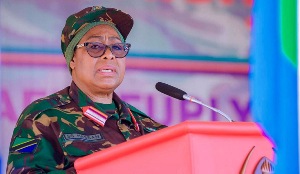 President of Tanzania and Commander-in-Chief Dr Samia Suluhu Hassan
President of Tanzania and Commander-in-Chief Dr Samia Suluhu Hassan
President Samia Suluhu Hassan on Tuesday warned foreign diplomats against “meddling” in Tanzania’s affairs, as she fights off allegations that state security agencies are responsible for the recent spate of abductions and killings of opposition leaders.
The worrying trend comes as the country prepares for local government elections in November and President Samia asserts that that her administration can – and will – handle the situation its own way.
In her first substantive comment on recent violent events that have cast a shadow over the upcoming civic polls, the president said statements of condemnation issued by several Western diplomatic missions stationed in Tanzania were not welcome and were in violation of the 1961 Vienna Convention on Diplomatic Relations.
Article 41 of the convention states that diplomats “have a duty not to interfere in the internal affairs of that State.”
Samia said that Tanzania would not take instructions from any country on how to go about investigating the politically linked violence.
The violence reached a new zenith on September 6 in the brazen abduction and subsequent killing of a senior Chadema secretariat member Ali Mohamed Kibao in Dar es Salaam.
Kibao was snatched by suspected plain-clothed security operatives off an upcountry-bound bus in full public view on the outskirts of the city.
His lifeless body was found in a nearby bush hours later, with his face partly disfigured by a chemical believed to be acid.
The incident came on the back of a growing number of disappearances, detentions and beatings involving political and human rights activists in what the United States mission in Dar es Salaam described in a September 9 statement as "efforts to disenfranchise citizens ahead of (the) elections."
The European Union, British and Canadian High Commissions, and Norway and Switzerland embassies also issued a joint statement condemning the trend on September 10.
While the US embassy in Dar called for an "independent, transparent, and prompt investigation" into the incidents, the other five missions called for a "thorough inquiry."
In a televised speech at an event in Moshi on Tuesday marking the 60th anniversary of the Tanzania Police Force's formation, President Samia said "outsiders" should not claim to be more pained by the events than Tanzanians themselves.
"It is our own responsibility to find out why they (abductions and killings) are happening at this moment in time. We know what we need to do as a sovereign nation, and do not appreciate other countries telling us to do one, two, three," she said.
"I believe these statements were not sanctioned by the heads of state of those countries, but I have my own ways of checking with my fellow presidents and once I confirm that they were not, I will lodge formal complaints with them."
Before the diplomatic corps intervened, the president had already ordered that Kibao's death be investigated and finalised as quickly as possible and the final report made public.
Prime Minister Majaliwa chipped in on Monday this week, stating that although it was "easy to point fingers at the police," other disruptive elements working covertly could be responsible for "such incidents that tend to crop up during periods of elections."
Meanwhile, Chadema party leader Freeman Mbowe has called for Britain's Scotland Yard to be incorporated in the Kibao murder probe, noting that the party did not trust Tanzanian law enforcement units to conduct a "proper and transparent" inquiry.
The party has also threatened to lead nationwide protests from next week if there is no tangible progress in the Kibao investigation by then.
Kibao's killing, along with the other incidents, have sparked public outrage and heightened safety concerns in relation to the nationwide municipal polls scheduled for November 28, which are expected to form the template for next year's general election, in which President Samia will be defending her incumbency and the ruling CCM its majority legislative control until 2030.